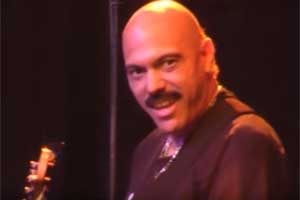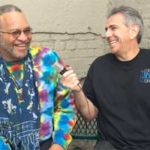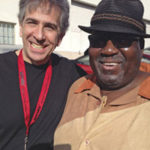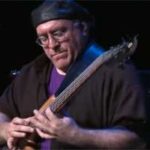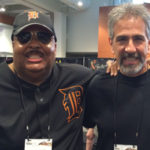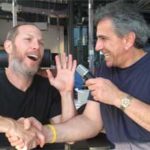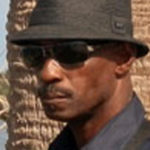Conversation with longtime George Clinton/P-Funk bassist covers the history, the players and all things funk!
Exclusive interview with FBPO’s Jon Liebman
March 30, 2016
Lige Curry is best known for his decades-long gig as bassist with George Clinton and Parliament Funkadelic. Originally from Flint, MI, Lige spent most of his formative years in Cleveland, OH, where he and his cousin, fellow P-funk band member Michael Hampton, learned music together and launched their respective careers.
In addition to P-Funk, Lige has worked with countless acts over the years, including the Starr Cullars Band, Incorporated Thang Band, the Brides of Funkenstein, Bootsy’s Rubber Band, Stanley Jordan, Phish, Sly Stone, Tracey Lewis, Jimmy G, Jessica Cleaves and many others.
FBPO: You’re from Flint, Michigan, right?
LC: I was born in Flint, Michigan. When I turned about 8 or 9, my parents decided to split up, so I left Flint with my mom and ended up going over to Cleveland, Ohio, where some of her family was. I was raised in Cleveland all the way through high school and college and into my adult life. I went to Central State University for two years and got with P-Funk a little bit after that.
FBPO: Tell me about your first exposure to music. How did you become a bass player?
LC: To be honest, I acquired a guitar first. I had a cousin, Michael Hampton, who played and I also wanted to experiment with some other things. I was very athletic already and I found that I could handle the coordination with the guitar. I had a little acoustic guitar, but my fascination was always with the bigger strings, you know, E-A-D-G, to the point where if I were to break the B or the (high) E, I would never replace them! [Laughs]
FBPO: Were you in Cleveland already by that time?
LC: Actually, when I was around the age of 3, growing up in Flint, I had an auntie who thought I was going to be a guitar player. Before I even moved to Cleveland, she got me a little acoustic guitar. Then she got me another one by the time I was about 5 or 6. I remember just tinkering with it and tinkering with it. So by the time I did get to Cleveland, at around age 10 or whatever, I became interested again in guitar through my cousin Mike. We both had guitars and tried to learn how to play them. We had a couple of groups that were separate from each other. I was the leader of my thing and he was the leader of his thing. I used to go over to his house and he’d come by my place and we’d rehearse. And he said, “Hey, man, why don’t you get a bass? We could put a group together.” And he was really excelling, I mean really, really fast. He had already gotten lessons. His father was able to pay for him to go and take some private lessons.
I ended up going and getting a bass and we ended up putting a band together. We dropped our respective bands that we were in. We got another guy from the east side of Cleveland that knew Mike really well and we started playing around until the P-Funk thing started coming into our lives. And that’s what we were doing. Fun, too! I actually loved those days better.
FBPO: Who were your influences on the bass once you discovered the instrument?
LC: Oh, man, I went to see Larry Graham when I was in high school. I already knew a little bit about the Sly Stone thing. I was puttin’ it all together.
FBPO: Was it Sly you saw, or was it Graham Central Station?
LC: It was Graham Central Station, but like I said, I put it all together later that he was that main guy with Sly Stone. I was always diggin’ some Sly anyway. Everybody in the neighborhood was, but I didn’t really put it together till later. It was Larry Graham that was definitely a big influence of the funk, with the way he slapped and everything.
It was really crazy that I ended up getting with P-Funk because we were listening to that stuff a lot, Mike and I, and we had learned a lot of that material already. The fact that it came to us like that was really amazing. Talk about law of attraction! My biggest influences at that time were more like Billy Bass Nelson and Cordell “Boogie” Mosson. I was listening to Bootsy, but not as much as I was listening to those guys.
FBPO: How about Bernard Odum?
LC: Yeah, yeah. He was there. I mean all of those guys that were doing it in the ‘70s. The funk thing is what everybody was doing. It was what everyone was trying to do. You tried to sound like those guys, from whatever James Brown started doing. I liked a lot of the guys. I liked Stanley Clarke, I liked Marcus Miller. I liked that side too. I like Victor Wooten. The guy that I came behind was Rodney “Skeet” Curtis. I loved him. Still love him, now that he’s with Maceo (Parker). Just having the opportunity to meet those kinds of guys and know ‘em was really a thrill for me. I was a fan of a lot of them before I even got in this band.
FBPO: Well, how did you get to meet all those guys?
LC: We had run into these guys because we were in a band in Cleveland, Mike and I, and these guys knew George Clinton and Parliament Funkadelic. They were friends. This was before George had a tour bus. They were just driving around in station wagons. They would stay at people’s houses instead of a hotel because they couldn’t afford it. So I knew these guys that knew them and they took us to a show, a concert at the Cleveland Public Hall in 1974, where Parliament Funkadelic was supposed to play. They were on a bill with a group called Osibisa and Rare Earth.
FBPO: Who was playing bass with Parliament?
LC: Back then, Billy Bass had left and Cordell “Boogie” Mosson was playing bass. Garry Shider was also in the band. When Billy left, he took the other guy, Tawl Ross, with him and they replaced them with Garry Shider and Cordell “Boogie” Mosson on bass. He was one of my dear teachers. He passed away, but I loved him so much. There’s so much that I still wish I was able to get from him.
FBPO: How did you end up getting the gig?
LC: I ended up going to school and then when I left school, I went to Milwaukee with a friend of mine and we put a band together. He was a guitar player that I met in Cleveland and his home was Milwaukee. So we went to Milwaukee and he knew some guys and we put it together, but it didn’t really work out.
So P-Funk came through Chicago, which is only about an hour and-a-half or so from Milwaukee. I got him to take me to the show so I could see Mike. Now, by this time it was 1978 and Mike had been with them for like four years. So I said I’m going to go see my cousin. I ended up going there and things kind of turned around. That’s when P-Funk’s road manager, Ron Brem, asked me if I would like to continue on the road. He said the management people wanted me to come out to just “kick it” with Mike. There were a lot of things going on at the time and we were young, so we didn’t understand a lot, so they felt like if Mike had some kind of companionship out there, that it would keep his mind focused. At that time, just to be frank, there were a lot of drugs, a lot of drugs. You know how the ‘70s were. It was nuts! You know, way before AIDS came in. [Laughs]
So that’s how I ended up meeting them. I ended up staying on the road with them and I acquired a job in management. I minored in business when I was in college, so I was able to have a few skills where I could go in and test out the waters with that side of it.
When I got there, Skeet was like the main guy, Rodney “Skeet” Curtis, and I didn’t think too much of it. I was still kickin’ with my cuz. And then all of the sudden, about a year into it, Skeet quit. Boogie Mosson was gone too. Garry Shider knew that I played bass. One day he came into the office at Hollywood and Vine and said, “Hey, man, you’re gonna be playin’ bass now. We’re gonna try you out on that side.” And I’m like, “Really?!” And he said, “Yeah.”
I thought there were a lot of other guys they would look at way before they looked at me, but he ended up telling me to come to rehearsal and we started rehearsing for this tour called the “Glory Hallastoopid” tour. And this was in 1979, getting ready to turn over to 1980. I auditioned in front of Eddie Hazel and Bernie Worrell. I remember I was scared shitless ‘cause those were two of my heroes I had already known from the albums. And I ended up getting the gig. Barely got it, I think, but I got it! [Laughs]
FBPO: Tell me about the gig. Tell me about being in the band, on the road and in the studio with George Clinton. You’ve gotta have a good story or two you can share!
LC: Being on the road with George is always the nuttiest. The studio is a lot more relaxed, but the zaniness that you do in the studio we try to take that out on the road. George, man. George is one of those guys. He’s the complete opposite of Sly Stone when it comes to making a show, making the gig. He really believes that you’ve gotta be “on” every show. If you sign up for it, you gotta do it. Regardless of what people might think, he’s really a punctual guy.
This one time, we were in Europe. I think it was the Roskilde Festival. Big, like 100,000 people. George had flown over by himself, but we had all of this crazy plane trouble and we were late. Really, really late. Like about three of four hours late, man. And it looked like we weren’t going to make it. By the time we got close enough to see what was going on in the festival, we could just kind of see the stage way off in the distance and they were trying to hurry us in. And George was onstage telling jokes! [Laughs]
FBPO: To a hundred thousand people?!
LC: [Laughing] This was the funniest shit! The band was saying, “Hey, man, look! George is … he’s onstage!” George is telling jokes. And the funniest part was we get to the stage and he’s like, “Good thing you guys came. I was running out of jokes!” We started like dying laughing and he was really holding the audience. We asked him, “How long have you been doing that?” He said, “For at least two and-a-half hours.” How many stories do you think he told? To put it all in a nutshell, that was the deepest story. Him telling a hundred of his stories to hold off the crowd until we actually got there.
We were so late, man. I remember him saying to me, “Don’t worry about tuning up your guitar. Just get it out and start playing.” I was like, “No, you must be crazy!” [Laughing] But they waited on us a little bit longer. They got it together. We were able to do the thing and make it happen.
FBPO: How did the show go?
LC: The show went crazy. I mean it was one of those things where we hurried up. I think the drummer was playing with some crazy sticks he had. Once we got into it, I think we got it going on.
FBPO: How long have you been playing with George Clinton and with Parliament Funkadelic?
LC: I started in 1979/80. That’s how long I’ve been doing it with this guy. I’ve met so many people through being with him, and made so many nice relationships over the years.
FBPO: How about Blackbyrd McKnight?
LC: Yeah, Blackbyrd McKnight actually is back with the band now. He was gone for like eight years and he was doing some things on his own, I think. And now he’s back because he’s on the new record. It’s called First Ya Gotta Shake the Gate and Blackbyrd is all over it, so he’s back in the band. Michael Hampton has stepped off and he’s doing some solo things of his own now.
FBPO: What else is keeping you busy these days, Lige?
LC: Man, I’m on the West Coast, producing some things. I’ve got a production for a young lady named Starr Cullars. She plays bass. She’s getting ready to drop another record called Living Galaxy. She also did the Rock & Roll Fantasy Camp. She’s now rubbing elbows the Sammy Hagars and the Paul Stanleys. She’s going more in that rock direction.
FBPO: Tell me about your equipment.
LC: I have a Sterling 5-string Music Man bass that I play through Aguilar amps.
FBPO: I know you’re a big fan of Bartolini, too.
LC: They haven’t made the pickups for me yet; I’m still like a work in progress. I did have one of their pre-amps installed in my five-string Music Man – and boy! The only reason the pickups can’t be installed is because this is a newer Sterling 5 and the casing is so new that they have to design a different pickup for the specific casing that I have. Till that time, I’ll just use the pre-amp, which is really kickin’, man! I’m blowing speakers! I’m not trying to, but Mr. Clinton kind of likes it loud on stage, so with P-Funk, we get really loud and sometimes he wants to push it, push it. I actually had to go inside the back of my bass and turn the volume down on the pre-amp. Once I did that, everything started to become more in control. Before that, I was tearing up stuff. I didn’t realize a pre-amp could be that powerful, man!
FBPO: How about the future, Lige? You’ve been with George Clinton for so long and you’ve done a bunch of other really cool stuff. Do you have a list of things you’ve always wanted to do but haven’t gotten around to yet?
LC: Well, you know, I’ve been wanting to do “me” to a certain extent. I have a project now, working with some younger guys and I try to rehearse with them at least a couple times a week. I have a CD called Ligedelic. I also have another group that I’m working with called the Naked Funk Band. These are the projects that I’ve been trying to get off, but I just need to put more time into them. Other than that, just having a good time, you know what I mean? How about that, just having fun? I’ve been blessed all these years to play music. That’s the most important thing to me, being happy.
FBPO: What would you be if you weren’t a bass player?
LC: I would be retired! I love sports. I’ve always loved the water. I wanted to get into sailing, I wanted to get into all that kind of crazy stuff, you know, sky diving and stuff like that. Nutty stuff. Stuff that you’d never think that you would do. [Laughs] That’s pretty much where I’m at.
